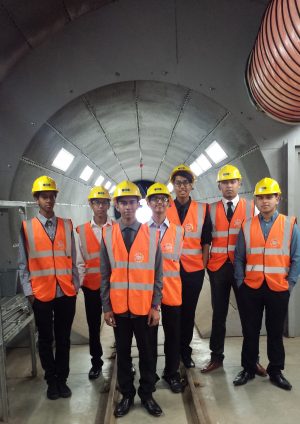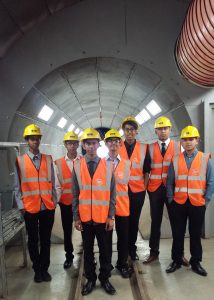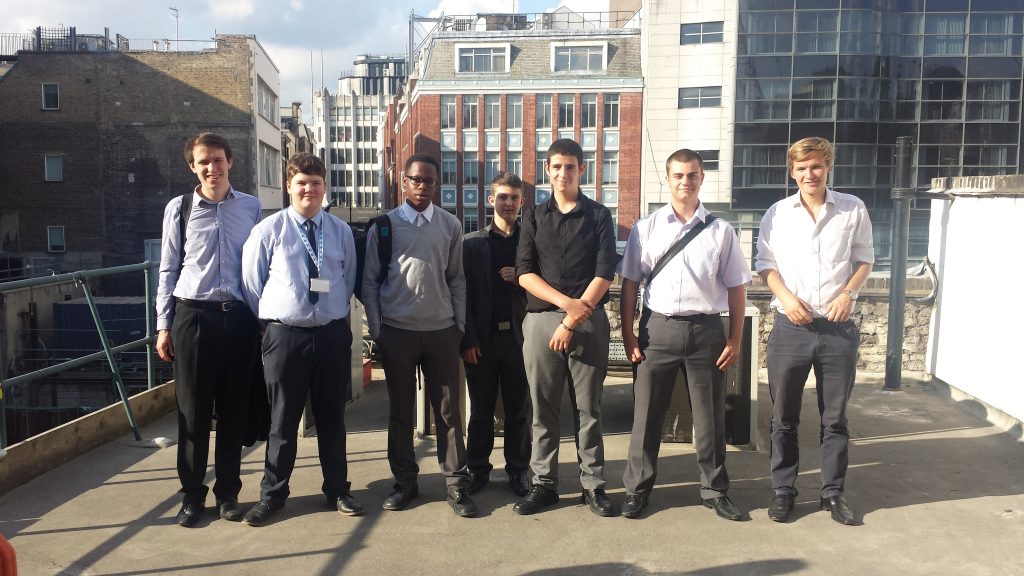
Corporate Work Experience Programme
Document
type: Micro-report
Author:
Lauren Hillier
Publication
Date: 27/09/2016
-
Abstract
This micro report provides an overview of work experience at Crossrail, with a focus on the establishment and delivery of the Corporate Work Experience Programme for Young Crossrail partner schools. The paper will identify key learnings and recommendations for the delivery an effective programme. The paper highlights the importance of getting buy- in from senior management, engagement of the supply chain and the contribution of volunteers within the organisation.
This micro report would be of interest to Work Experience Managers; Youth Engagement Mangers; STEM Education Managers; and HR Professionals
-
Read the full document
Introduction & Context
Providing meaningful work experience placements to young people has been an integral part of Crossrail’s overall Skills and Employment strategy. In 2012, the requirement for compulsory work experience in England was removed, however, with an emerging skills gap in the construction and engineering industries, Crossrail acknowledged the importance of providing students with meaningful work experience on the project to inspire and encourage young people to join these industries.
The Young Crossrail Programme began in 2009 with a small number of initiatives targeting every school in London. This delivery model was revised with the Crossrail Skills and Employment Strategy in 2010, with the Young Crossrail Programme targeting a small number of partner schools, with the programme evolving to meet the needs of the school curriculum, students and teachers.
Until 2013, Young Crossrail did not run a structured work experience scheme; however, Crossrail staff have always had the opportunity to host family members on work experience placements on the project.
From 2013, the Young Crossrail programme started working closely with six partner schools to build sustainable relationships with teachers and students and deliver a programme of STEM (Science, Technology, Engineering and Maths) and employability related engagements. The Corporate Work Experience scheme existed as part of this programme offering and extended its reach to two more partner schools in 2015.
The Corporate Work Experience scheme aimed to provide students from partner schools with the opportunity to gain practical experience of working on the largest infrastructure project in Europe and to inspire young people to consider a career in engineering. The structured scheme focused on providing quality work experience placements for young people based on available resources within the Young Crossrail team.
The Work Experience, Internships and Secondment Policy outlines Crossrail’s approach in further detail.
Crossrail Corporate Work Experience Scheme
Young Crossrail chose to work exclusively with partner schools to deliver a structured work experience scheme in order to provide quality placements with positive impact. From initial meetings with head teachers at partner schools, it was evident that a key outcome of the relationship was for Young Crossrail to provide work experience placements to their students. Partner schools wanted students to have the opportunity to gain exposure to a work environment, develop new skills and develop higher levels of self esteem.
Evidence from the UK Commission for Employment and Skills (UKCES) and The Graduate Market suggest that there is a direct link between undertaking relevant work experience and subsequently joining a profession. [1]
The placements typically ran for two weeks and took place over the academic year. A placement of two weeks was considered suitable as it balanced the need to provide meaningful work experience to students with resources available by the hosts.
Students who participated in the work experience scheme were aged between 14-17 years old (years 10-12).
Of nine Young Crossrail partner schools, eight undertook work experience placements at Crossrail. The one school that chose not to participate was a new school with students who were not old enough to participate in the scheme. The Young Crossrail Programme committed to take up to 30 students across the eight schools over the academic year. This number was considered appropriate and in line with the programmes’ commitment providing quality work experience placements. Provision of 30 work experience per year was met or exceeded in every year of the corporate work experience scheme.
Figure 1 – Crossrail work experience students visit the Tunnelling & Underground Construction Academy (TUCA)
The Process
At the beginning of each academic year, the Young Crossrail team contacted partner schools to confirm work experience dates. This allowed the team time to promote the corporate work experience scheme across the project and recruit work experience hosts. The work experience scheme relied heavily on involving the supply chain contractors and the wider pool of Young Crossrail ambassadors. The Young Crossrail team regularly promoted the scheme to colleagues across the project through internal communication channels, the monthly Young Crossrail volunteering email and in house publications. The team also met with community investment colleagues working on site to get buy in from their teams. Both Crossrail’s Chairman and Chief Executive were strong advocates of the Young Crossrail scheme and saw value in the work it carried out. This senior level buy in had a positive influence on how the rest of the organisation viewed work experience.
Before the placement
To ensure that the work experience was mutually beneficial to the student and the host, an assessment session was held to recruit genuinely interested, motivated and engaged students. In addition to assessing the most suitable students for placements, the sessions provided a chance to understand areas of interest, identify transferable skills and to support students with personal development. Assessment centres are more commonly associated with recruitment of graduates or apprentices, however, the model proved effective in adding value to the corporate work experience process. Partner schools were asked to select a cohort of students to attend the session. The assessment session was delivered by Young Crossrail six to eight weeks before the confirmed start dates.
The duration of the assessment was three hours and included:
- Introduction to Crossrail
- Overview of the work experience offering
- Application form
- Team activity
- Interviews
Confirmed work experience hosts and/or those who expressed interest in hosting students were encouraged to attend assessment sessions to assist with interviewing students and to identify students that would be a good match within their teams. On average, 80% of hosts attended assessment sessions prior to work experience taking place. On occasion, the quantity of hosts required could not be confirmed in time due to some schools requiring the assessment session to take place more than four months before the placement start date. In this instance, Young Crossrail Ambassadors assisted with the assessment centres.
Feedback on the assessment sessions from hosts was positive with 100% of hosts expressing that they were happy with the information Young Crossrail sent in advance of students starting placements. One host commented:
“Being able to interview the students really helped us choose someone who was a great fit and could really benefit from time with us”.
Equally, teachers were happy with the assessment process involved and felt that this added value to students and assisted in their development. One teacher from a partner school said:
“I cannot overstate the impact this has on our students. It is so important for us to raise aspirations and to help our students to aim higher, and the work experience assessment session undoubtedly did this. There’s plenty of evidence that this sort of event correlates with better results.”
Extending the work experience scheme from six to eight schools meant that it was important to better use the resources of the Young Crossrail team to ensure effective delivery. From the 2014/15 academic year, assessment sessions were held for held for more than one school at a time (approximately three per year).
Work Experience Hosts were provided with a Work Experience Host Pack which included effective guidance on hosting a student, logistics for the placement, and safeguarding and risk assessment documentation.
The Young Crossrail team supported hosts prior the placement by arranging IT services and booking students on to the Introducing Crossrail induction session which provided information about the project and Crossrail’s Values. The Young Crossrail team also supported hosts for the duration of the placement.
During the placement
Hosts were primarily responsible for timetabling a two week placement for students, however, to balance the commitments of the host, Young Crossrail organised some activities for the work experience students, including:
- A tour of the Tunnelling and Underground Construction Academy (TUCA) and half day employability skills workshop
- Visit to a Crossrail site
In 2014/15 the corporate work experience scheme was mapped to the BTEC Level 2 Award in Work Skills in order to add value to the overall scheme. Students could work towards gaining one or both certificates for the following units:
- Preparing for Work Placement (unit 26)
- Learning from Work Placement (unit 27)
The learning outcomes of both BTEC modules focused on preparing students for the world of work including understanding the organisations’ structure, mission and values.
The Preparing for Work Placement module was delivered in the work experience assessment session and focused on students considering their skills and setting goals to maximise their skills during the work placement.
Students who were successful in securing a work experience placement were provided with a Work Experience Diary allowing them to key a daily log during their placement to allow reflection on their work experience placement and set goals for the future, satisfying the Learning from Work Placement module.
Mapping the corporate work experience scheme to a nationally recognised awarding body allowed Crossrail to follow best practice and ensured better quality placements for learners. Crossrail added value to the scheme through trips to Crossrail sites and the Tunnelling and Underground Academy in Ilford. These trips received some of the highest feedback amongst students in their evaluation forms as it provided an insight of the Crossrail project’s delivery.
Work Placement Graduation
On the last day of placement, Young Crossrail hosted a review session where students presented their experience to their peers and hosts. This provided an opportunity for students to practice presentation and communication skills as well as providing hosts and students with an opportunity to provide feedback on the Work Experience process.
Work Experience Certificates and Crossrail goodie bags were awarded to the students at the end of the review session.Learning & Evaluation
Both hosts and students were asked to complete evaluation forms during the work placement graduation session. Student evaluation forms provided feedback on several areas, including skills development, perceptions of engineering careers and overall satisfaction and rating of the placement.
Hosts were asked to complete two evaluation forms, which provided feedback on the suitably of the student they hosted but on the support they received from the Young Crossrail team in the lead up to and during the placement.
Schools were provided with the host feedback for each student. This allowed the schools to understand how the placement progressed and note any achievements and/or improvement areas for student’s development at school. The student also received a copy of the host’s feedback, which included a personal reference which could be used in future applications to sixth form, college, university and employment.
All feedback was recorded in a spreadsheet by the Young Crossrail team, this system provided ease of reference for future internal reporting and requests for information.
Since the scheme began in 2013, 98% of students have rated the work experience as good or excellent. Similarly 96% of hosts rated their experience of hosting a work experience student as good or excellent.
Lessons Learned
- When the corporate work experience scheme was established, Young Crossrail did not run a selection process. Partner schools selected students for placements meaning that some students arrived for placements disengaged and unmotivated. This had potential to reflect negatively on the team and discouraged hosts from offering to hosts students again.
- On occasions, schools arrived at the assessment sessions with fewer students than agreed. This impacted the running of the sessions and limited the opportunity for students from other schools to take part. Ensure that schools are aware of the obligations and impact of not following the process. This could be addressed by providing a guidance document outlining the protocol, process and commitment required.
Recommendations for Future Projects
- Liaise with schools at the beginning of the academic year (September) to confirm placement dates
- Engage with hosts from September and involve them in the selection/assessment process and review session. Feedback from hosts concluded that this made for a seamless operation and allowed clear communication between all parties.
- Organise “out of office” activities for students to provide students with wider exposure to the project whilst relieving commitment from the host.
- Equip those responsible for establishing work experience schemes with suitable resources. Crossrail and others contributed to the Tomorrow’s Engineers Engineering Work Experience, An Employers Guide which can be used as a best practice tool kit by employers wishing to develop and deliver engineering work experience.
- Work placements must have a business case – which for Crossrail was to improve the attractiveness of the infrastructure and transport sector given the low number of new entrants aged 16-24.
References
[1] UKCES, Employer Perspectives Survey 2014
-
Document Links
-
Authors
Lauren Hillier - Crossrail Ltd
Lauren Hillier was the Young Crossrail Programme Manager until September 2016. Lauren was responsible for the delivery of Crossrail’s education programme, Young Crossrail, including stakeholder management, the Young Crossrail Ambassador Programme, as well as STEM activity and projects. Lauren joined Crossrail in April 2013 supporting the Skills and Employment team to deliver Crossrail’s skills and employment agenda before joining the Young Crossrail team in November 2013.



